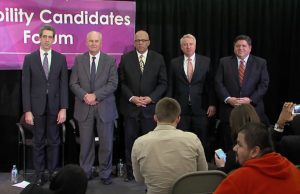Democratic candidates for governor court Illinois’ disabled voters
By Kevin Beese Staff reporter — January 29, 2018
The five men running to be Democratic nominee for governor (from left) Daniel Biss, Bob Daiber, Tio Hardiman, Chris Kennedy and J.B. Pritzker, spoke at the candidate forum on disability Jan. 18. (Blueroomstream.com)
The five men running to be the Democratic nominee for governor all boast of ties to the state’s disabled community.
The candidates — Daniel Biss, Bob Daiber, Tio Hardiman, Chris Kennedy and J.B. Pritzker — all looked to strike a chord with audience members and viewers of the Disability Candidates Forum held earlier this month at Access Living in Chicago.
It is estimated that there are 1.4 million disabled people in Illinois, almost 11 percent of the state’s population
Andres J. Gallegos, Access Living board chairman, said at the Jan. 18 forum that the disabled community feels threatened from policies, legislation and pronouncements from Washington D.C. and Springfield.
“We feel under attack in the state as disability service providers, in the last two fiscal years, had to curtail critical services and lay off staff as the state breached its contractual obligations to pay for many of their services,” Gallegos said. “We face discrimination in housing, education, transportation.”
He said member of the disabled community feel marginalized when state elected officials hold news conferences without sign language interpreters or post videos to their Facebook pages addressing Illinoisans, but don’t provide captioning.
“What affects one segment of our disabled community affects us all,” the Access Living representative said. “We need our state leaders, particularly in the governor’s office, to understand these issues.”
The candidates spoke about their ties to the disabled community and their plans to improve conditions for the disabled in the state.
Biss
State Sen. Daniel Biss said many of his friends and people he knows live with disabilities. He said he has been honored to work on legislation with advocates for the disabled community.
“I worked with Access Living to protect the community care program from (Gov.) Bruce Rauner’s dangerous cuts and to fight for an employment first policy in Illinois,” Biss said.
He said the state needs to enact social services based on the premise that every single person in Illinois is owed the right to the opportunity to achieve his or her full potential.
Biss thanked the disabled community for its vision of disability rights as civil rights and its efforts to build a powerful movement with solidarity between different entities.
“We have a unique responsibility to all stand shoulder to shoulder and all stand arm in arm,” Biss said.
Daiber
A public servant for 38 years — 28 of them as a teacher — Bob Daiber said he has taught students with developmental and physical disabilities, and helped children in wheelchairs be able to attend school.
He pointed to his work as Madison County regional school superintendent, creating the Secondary Transition Experience Program, helping link 280 students with disabilities with 100 employers.
Daiber noted that as a public official he helped make facilities compliant with the Americans with Disabilities Act.
“We have to train people in law enforcement to understand people with disabilities,” Daiber said. “We need to do more in education to help children with disabilities. We need to help the general public understand that by providing services, we are preparing disabled citizens for our future.”
Hardiman
Longtime activist Tio Hardiman noted that his stepdaughter struggles with autism, but still was able to achieve honor roll status at Chicago Bulls College Prep and is now attending Loyola University.
“I’ve done a lot of work in the disabled community, mainly in nursing home settings,” Hardiman said. “I definitely agree with moving beyond nursing homes and integrating more services in the community because you and I know those nursing home conditions are deplorable at times to a lot of residents.”
He said his 2020 plan also includes support for veterans, senior citizens, college students and a progressive tax — the financial transaction tax.
“A lot of people talk about the black and brown communities, but I was born into issues of racism, discrimination, police brutality and all kinds of other issues,” Hardiman said.
Kennedy
Businessman Chris Kennedy said members of the disability community were the first people to welcome him to Chicago when he moved to the area in 1986.
He points with pride to his ongoing work with Special Olympics.
“I’ve seen the entire movement transition from sort of a paternalistic organization to one about freedom and about self-determination,” Kennedy said.
He noted that as chairman of the University of Illinois’ board of trustees, he worked hard to bring recognition to Tim Nugent who pioneered ideas around universal access in higher education.
“That’s how I want people to think about us, to define Illinois, define Chicago … how people with disabilities lead our government, lead our businesses, lead our society,” Kennedy said.
Pritzker
Venture capitalist J.B. Pritzker said he is proud to have supported work done by many organizations on behalf of the disabled community and led by people with disabilities.
“You were on the front lines with me and others fighting against Donald Trump’s efforts to repeal the (Affordable Care Act),” Pritzker said to the forum’s audience. “Because of your organizations, the Americans with Disabilities Act — the landmark civil rights law that has expanded access and opportunity for people living with disabilities throughout this country — is the law of the land today.”
Pritzker said that the state’s governor must ensure programs are meeting the needs of the disabled.
“I will not use the power of the executive branch to keep you out of state government or those programs,” he said. “Instead, people with disabilities will be intentionally included in those programs.”
— Democratic candidates for governor court Illinois’ disabled voters . —







